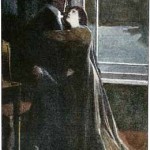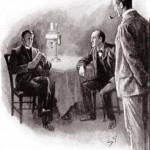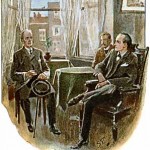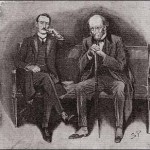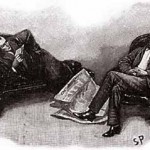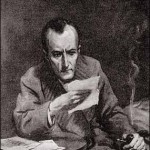When one considers that Mr. Sherlock Holmes was in active practice for twenty-three years, and that during seventeen of these I was allowed to cooperate with him and to keep notes of his doings, it will be clear that I have a mass of material at my command. The problem has always been not to find but to choose. There is the long row of year-books which fill a shelf and there are the dispatch-cases filled with documents, a perfect quarry for the student not only of crime but of the social and official scandals of the late Victorian era. Concerning these latter, I may say that the writers of agonized letters, who beg that the honour of their families or the reputation of famous forebears may not be touched, have nothing to fear. The discretion and high sense of professional honour which have always distinguished my friend are still at work in the choice of these memoirs, and no confidence will be abused. I deprecate, however, in the strongest way the attempts which have been made lately to get at and to destroy these papers. The source of these outrages is known, and if they are repeated I have Mr. Holmes’s authority for saying that the whole story concerning the politician, the lighthouse, and the trained cormorant will be given to the public. There is at least one reader who will understand.
It is not reasonable to suppose that every one of these cases gave Holmes the opportunity of showing those curious gifts of instinct and observation which I have endeavoured to set forth in these memoirs. Sometimes he had with much effort to pick the fruit, sometimes it fell easily into his lap. But the most terrible human tragedies were often involved in those cases which brought him the fewest personal opportunities, and it is one of these which I now desire to record. In telling it, I have made a slight change of name and place, but otherwise the facts are as stated.
One forenoon–it was late in 1896–I received a hurried note from Holmes asking for my attendance. When I arrived I found him seated in a smoke-laden atmosphere, with an elderly, motherly woman of the buxom landlady type in the corresponding chair in front of him.
“This is Mrs. Merrilow, of South Brixton,” said my friend with a wave of the hand. “Mrs. Merrilow does not object to tobacco, Watson, if you wish to indulge your filthy habits. Mrs. Merrilow has an interesting story to tell which may well lead to further developments in which your presence may be useful.”
“Anything I can do–”
“You will understand, Mrs. Merrilow, that if I come to Mrs. Ronder I should prefer to have a witness. You will make her understand that before we arrive.”
“Lord bless you, Mr. Holmes,” said our visitor, “she is that anxious to see you that you might bring the whole parish at your heels!”
“Then we shall come early in the afternoon. Let us see that we have our facts correct before we start. If we go over them it will help Dr. Watson to understand the situation. You say that Mrs. Ronder has been your lodger for seven years and that you have only once seen her face.”
“And I wish to God I had not!” said Mrs. Merrilow.
“It was, I understand, terribly mutilated.”
“Well, Mr. Holmes, you would hardly say it was a face at all. That’s how it looked. Our milkman got a glimpse of her once peeping out of the upper window, and he dropped his tin and the milk all over the front garden. That is the kind of face it is. When I saw her–I happened on her unawares–she covered up quick, and then she said, ‘Now, Mrs. Merrilow, you know at last why it is that I never raise my veil.'”
“Do you know anything about her history?”
“Nothing at all.”
“Did she give references when she came?”
“No, sir, but she gave hard cash, and plenty of it. A quarter’s rent right down on the table in advance and no arguing about terms. In these times a poor woman like me can’t afford to turn down a chance like that.”
“Did she give any reason for choosing your house?”
“Mine stands well back from the road and is more private than most. Then, again, I only take the one, and I have no family of my own. I reckon she had tried others and found that mine suited her best. It’s privacy she is after, and she is ready to pay for it.”
“You say that she never showed her face from first to last save on the one accidental occasion. Well, it is a very remarkable story, most remarkable, and I don’t wonder that you want it examined.”
“I don’t, Mr. Holmes. I am quite satisfied so long as I get my rent. You could not have a quieter lodger, or one who gives less trouble.”
“Then what has brought matters to a head?”
“Her health, Mr. Holmes. She seems to be wasting away. And there’s something terrible on her mind. ‘Murder!’ she cries. ‘Murder!’ And once I heard her: ‘You cruel beast! You monster!’ she cried. It was in the night, and it fair rang through the house and sent the shivers through me. So I went to her in the morning. ‘Mrs. Ronder,’ I says, ‘if you have anything that is troubling your soul, there’s the clergy,’ I says, ‘and there’s the police. Between them you should get some help.’ ‘For God’s sake, not the police!’ says she, ‘and the clergy can’t change what is past. And yet,’ she says, ‘it would ease my mind if someone knew the truth before I died.’ ‘Well,’ says I, ‘if you won’t have the regulars, there is this detective man what we read about’–beggin’ your pardon, Mr. Holmes. And she, she fair jumped at it. ‘That’s the man,’ says she. ‘I wonder I never thought of it before. Bring him here, Mrs. Merrilow, and if he won’t come, tell him I am the wife of Ronder’s wild beast show. Say that, and give him the name Abbas Parva. Here it is as she wrote it, Abbas Parva. ‘That will bring him if he’s the man I think he is.'”
“And it will, too,” remarked Holmes. “Very good, Mrs. Merrilow. I should like to have a little chat with Dr. Watson. That will carry us till lunch-time. About three o’clock you may expect to see us at your house in Brixton.”
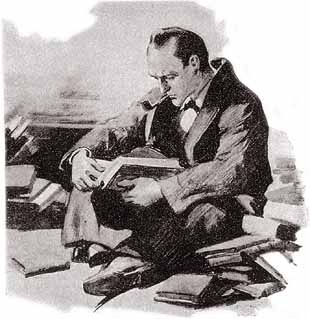
Our visitor had no sooner waddled out of the room–no other verb can describe Mrs. Merrilow’s method of progression–than Sherlock Holmes threw himself with fierce energy upon the pile of commonplace books in the corner. For a few minutes there was a constant swish of the leaves, and then with a grunt of satisfaction he came upon what he sought. So excited was he that he did not rise, but sat upon the floor like some strange Buddha, with crossed legs, the huge books all round him, and one open upon his knees.

